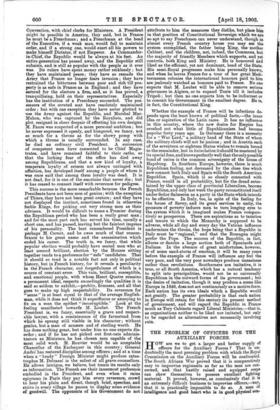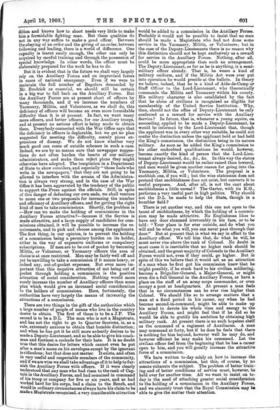THE PROBLEM OF OFFICERS FOR THE AUXILIARY FORCES.
HOW are we to get a larger and. better supply of officers for the Auxiliary Forces ? That is un- doubtedly the most pressing problem with which the Royal Commission on the Auxiliary Forces will be confronted. The South African War proved that it is comparatively easy to improvise regiments as far as the men are con- cerned, and that hastily raised and equipped corps can show themselves to possess excellent fighting material. It proved, however, as conclusively that it is an extremely difficult business to improvise officers,—nay, that it is practically impossible to do so. A man of intelligence and good heart who is in good physical con- dition and knows how to shoot needs very little to make him a formidable fighting man. But these qualities do not in any way suffice to make a good officer. Between the obeying of an order and the giving of an order, between following and leading, there is a world of difference. One capacity is learnt easily enough, the other can only be acquired by careful training and through the possession of special knowledge. In other words, the officer must be e aborately prepared for the work he has to do.
But it is evident that in the future we shall very largely rely on the Auxiliary Forces and on improvised forces in cases of national emergency. Even if we were to maintain the full number of Regulars demanded by Mr. Brodrick as essential, we should still be certain in a big war to fall back on the Auxiliary Forces. But the Auxiliary Forces are at present short of officers by many thousands, and if we increase the numbers of Yeomanry, Militia, and Volunteers, as we shall do, this deficiency of officers will become an even more formidable difficulty than it is at present. In fact, we want many more officers, and better officers, for our Auxiliary troops, and at present no serious effort is being made to obtain them. Everybody connected with the War Office says that the deficiency in officers is deplorable, but we get no plan suggested for meeting the difficulty, merely pious ex- pressions of dismay. We do not know whether very much good can come of outside schemes in such a case. Indeed, we are by no means sure that newspaper sugges- tions do not often harden the hearts of our military administrators, and make them reject plans they might otherwise have adopted. The temptation in a Department of State to show outsiders, and especially "those fools who write in the newspapers," that they are not going to be allowed to interfere with the arcana of the Administra- tion is always very strong, and in the case of the War Office it has been aggravated by the tendency of the public to support the Press against the officials. Still, in spite of this danger of defeating our own ends, we shall venture to name one or two proposals for increasing the number and efficiency of Auxiliary officers, and for getting the right kind of men to take commissions. Shortly, the problem is —How can we make the holding of commissions in the Auxiliary Forces attractive ?—because if the Service is made attractive, and a large supply of candidates for com- missions obtained, it will be possible to increase the re- quirements, and to pick and choose among the applicants. The first thing, in our opinion, is to prevent the holding of a commission being a pecuniary burden on its holder, either in the way of expensive uniforms or compulsory subscriptions. If men are to be out of pocket by becoming Militia, or Volunteer, or Yeomanry officers the area of choice is at once restricted. Men may be fairly well off and yet be unwilling to take a commission if it means heavy, or indeed any, out-of-pocket expenses. But even more im- portant than this negative attraction of not being out of pocket through holding a commission is the positive attraction of social consideration. Nothing would more surely increase the number of Auxiliary officers than some plan which would give an increased social consideration to the holders of commissions. Here, fortunately, the authorities have very largely the means of increasing the attractions of a commission.
There are two things in the gift of the authorities which a large number of people of means who live in the country desire to obtain. The first of these is to be a J.P. The second is to be a D.L. The man who is not a Magistrate, and has not the right to go to Quarter Sessions, is, as a rule, extremely anxious to obtain that humble distinction; and when he has got it he still more ardently desires to be made a Deputy-Lieutenant, and so be able to give his coach- man and footmen a cockade for their hats. It is no doubt true that this desire for letters which cannot even be put after a man's name on his envelopes except by the ignorant is ridiculous; but that does not matter. It exists, and often in very useful and respectable members of the community, and if we are wise we shall take advantage of it to help to fur- nish the Auxiliary Forces with officers. If it were clearly understood that any man who had risen to the rank of Cap- tain in the Auxiliary Forces, and had remained in command of his troop or company for five or six years, and so had worked hard for his corps, had a claim to the Bench, and Would in ordinary circumstances always have his claim to be made a Magistrate recognised, a very considerable attraction would be added to a commission in the Auxiliary Forces. Probably it would not be possible to insist that no man should be made a Magistrate who had not done some service in the Yeomanry, Militia, or Volunteers ; but in the case of the Deputy-Lieutenants there is no reason why this distinction should not be kept exclusively as a rewaxe for service in the Auxiliary Forces. Nothing, after all, could be more appropriate than such an arrangement. The Deputy-Lieutenant, as far as he is anything, is a semi- military officer already. That is, he wears a kind d military uniform, and if the Militia Act were ever put into operation he would preside at the ballots. In theory we believe, indeed, that he is a kind of Aide-de-Camp or Staff Officer to the Lord-Lieutenant, who theoretically commands the Militia and Yeomanry within his county. His military character is also established by the fact that he alone of civilians is recognised as eligible for membership of the United Service Institution. Why, then, should not the office of Deputy-Lieutenant be only conferred as a reward for service with the Auxiliary Service ? In future, that is, whenever a young squire, on succeeding, applied to be made a Deputy-Lieutenant, he would be informed by the Lord-Lieutenant that, though the applicant was in every other way suitable, he could not confer the distinction unless the applicant held or had held the King's commission, the distinction being in its nature military. As soon as he added the King's commission to his other undoubted qualifications he would, however, become exactly the kind of person that the Lord-Lieu- tenant always desired, &c, &c., &c. In this way the status of Deputy-Lieutenant would be rather raised than lowered, and men would be given another reason for going into the Yeomanry, Militia, or Volunteers. The proposal is a snobbish one, if you will ; but the wise statesman does not pretend that snobbishness does not exist, but converts it to useful purposes. And, after all, is not the cant about snobbishness a little unreal ? The Garter, with its KG., performs a very useful part in high politics. Why should not the D.L. be made to help the State, though in a humbler field ?
There is yet another way, and this one not open to the taunt of snobbishness, by which the holding of a commis- sion may be made attractive. No Englishman likes to have any door slammed irrevocably in his face, or to be told : "Your place is for ever outside, and do what you will and be what you will, you can never pass through that door." But at present that is what we say in effect to the Auxiliary officer. We tell him that, do what he will, he must never rise above the rank of Colonel. No doubt in most cases it is inevitable that no higher rank should be obtained, and the great majority of Colonels in the Auxiliary Forces would not, even if they could, go higher. But in spite of this we believe that it would act as an attraction if a man when he first got his commission knew that he might possibly, if he stuck hard to his civilian soldiering, become a Brigadier-General, a Major-General, or might even die a full General in the Auxiliary Forces, or have a place on the staff of an army corps commander, or even occupy a post at headquarters. At present a man feels that in no circumstances can he ever rise higher than Colonel. We should like so to arrange matters that a man at a fixed period in his career, say when he had become second-in-command, might be able to make up his mind to devote his whole time and energy to the Auxiliary Forces, and might feel that if he did so he would be able to gratify his ambition by obtaining high military rank. At present there is no such hopeless shelf as the command of a regiment of Auxiliaries. A man may command at forty, but if he does he feels that there is nothing for him beyond, however well he may do, and. however efficient he may make his command. Let the civilian officer feel from the beginning that he has a career open to him, and you will greatly increase the attractive force of a commission.
We have written to-day solely on how to increase the attractions of a commission, but this, of course, by no means exhausts the subject. The problem of better train- ing and of better conditions of service must, however, be held over for another time. All we want to insist on to- day is the need of attaching greater social consideration to the holding of a commission in the Auxiliary Forces, and we sincerely trust that the Royal Commission may be able to give the matter their attention.







































 Previous page
Previous page